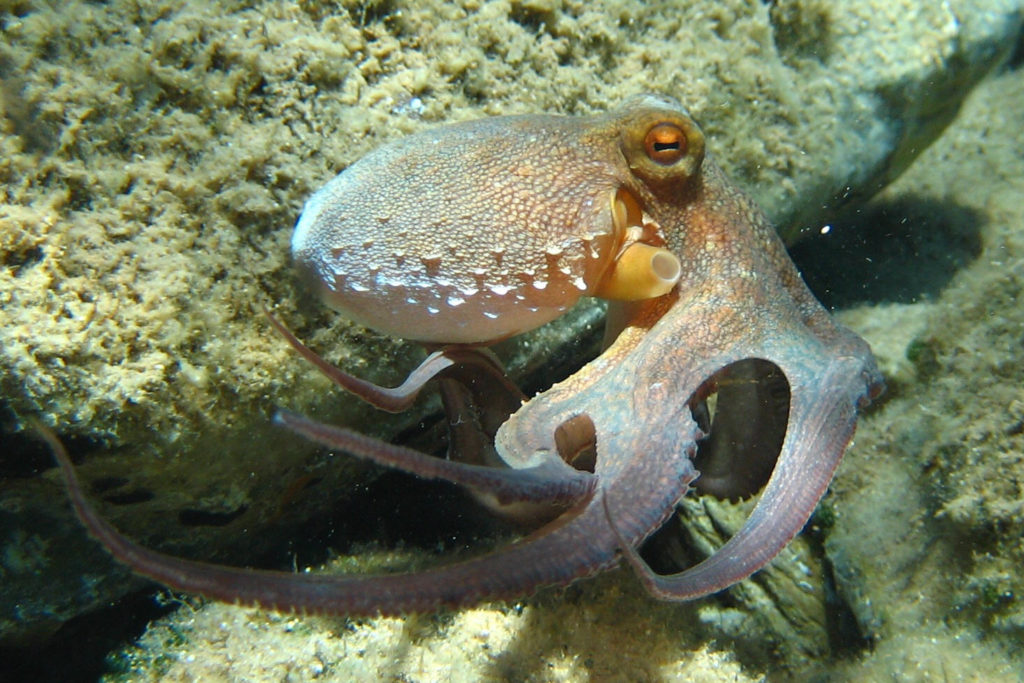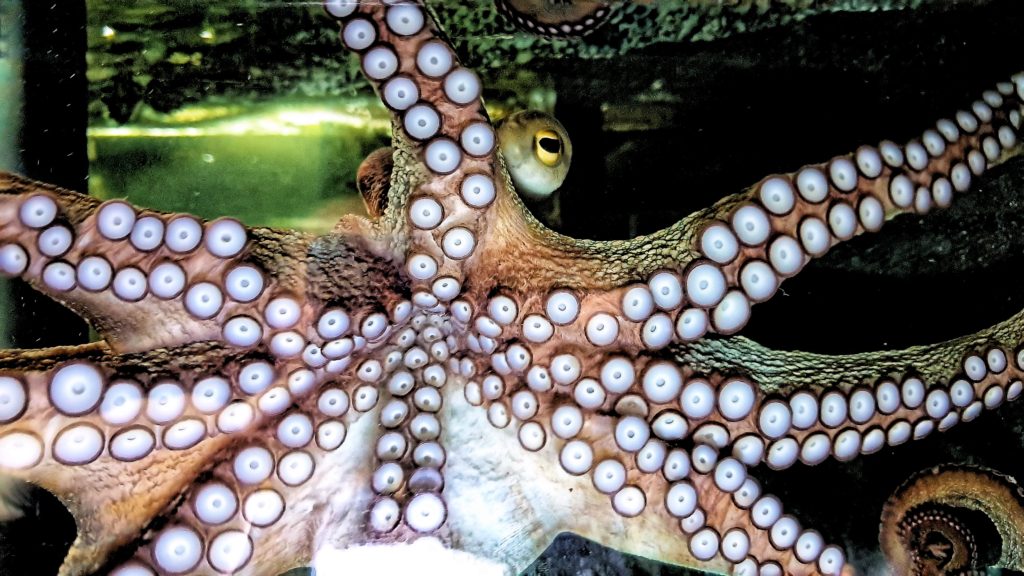No, it isn’t an official day, endorsed by the United Nations or the U.S. Congress or even Charlie the Tuna. The origins are as murky as a cloud of octopus ink. According to one site, it began in 2007, but no one has claimed responsibility. And it is on October 8 because, well, because the “oct”-opus has 8 legs.

So, eight cheers for the octopus, a not so humble denizen of the world’s marine shorelines. Octopuses (and yes, it is octopuses, not octopi, because the word’s origin is Greek) are pretty remarkable creatures. They have eight suction-cup covered arms, each of which is largely independent of the rest of the creature. Each arm is packed with neurons that give an octopus extraordinary senses of touch and smell. So, an octopus can be catching prey with one arm while battling off predators with another. Octopuses are also intelligent—as intelligent as a domestic cat, I’ve read—able to use tools, map out their habitats, and change colors to match the background. They have three hearts which transport blue blood (incorporating copper, not iron, into the blood molecules) around their body. The body itself is worn like a hat, on top of the head, and the head attaches directly to the arms. Octopuses are soft bodied (except for a hard biting beak), able to wiggle through small spaces and transform their shapes to look bigger and more ferocious or smaller and inconspicuous. Some species are small and inconspicuous—a few inches across—while the Pacific octopus can weigh more than 100 pounds and reach 30 feet from one arm tip to another.

They are also remarkable diverse and resilient. Fossil specimens date back about 300 million years, predating dinosaurs and vastly outlasting them. They come in 289 species, distributed in all the oceans and seas of the world. We have no idea how many exist, because they are solitary, territorial and cryptic—counting them is pretty much out of the question. They have short life spans of just a few years and produce hundreds of thousands of young each year. Consequently, population sizes can fluctuate wildly from year to year.
All in all, it seems octopuses are thriving just as well now as 300 million years ago. Only one species found in New Zealand is endangered; the other 288 are of “least concern” or unknown status. Commercial fisheries are thriving, although worldwide catches vary a lot annually. Catches peaked in the 1960s, at about 100,000 tons per year (that’s a lot of calamari!); current catches are around 30,000 tons. A recent article suggested that octopuses will probably keep on doing well, replacing the ecological niche that overfished marine species had occupied. They can also respond quickly to favorable environmental conditions, as occur during El Nino years.

Lest you feel that the octopus is getting undue attention with its own day, never fear. Cephalopods get most of a week for celebration. October 9 is Nautilus Night, and the 10th is Squid/Cuttlefish Day (what do you call an affectionate octopus? A cuddle fish). October 11th is devoted to the kraken, a mythological giant sea monster that was modeled after the giant squid. Krakens were believed to be the size of small islands, able to envelop and sink large sailing ships.
Octopuses of different species are hard to separate, looking more or less alike. Yes, they are pretty much i-tenticle!
References:
Arkhipkin, Alexander. 2016. Here’s Why Octopus and Squid Populations Are Booming. The New Republic, May 25, 2016. Available at: https://newrepublic.com/article/133734/heres-octopus-squid-populations-booming. Accessed August 27, 2019.
Bradford, Alina. 2017. Octopus Facts. Silversea, June 8, 2017. Available at: https://www.livescience.com/55478-octopus-facts.html. Accessed August 27, 2019.
Courage, Katherine Harmon. 2013. Happy International Octopus Day! Scientific American, October 8, 2013. Available at: https://blogs.scientificamerican.com/octopus-chronicles/happy-international-octopus-day/. Accessed August 27, 2019.
Food and Agriculture Organization of the United Nations. Species Fact Sheets—Octopus vulgaris. Available at: http://www.fao.org/fishery/species/3571/en. Accessed Augusst 27, 2019.
The Museum of Unnatural Mystery. The Kraken. Available at: http://www.unmuseum.org/mob/kraken.htm. Accessed August 27, 2019.
The National Wildlife Federation. Octopuses. Available at: https://www.nwf.org/Educational-Resources/Wildlife-Guide/Invertebrates/Octopuses. Accessed August 27, 2019.
